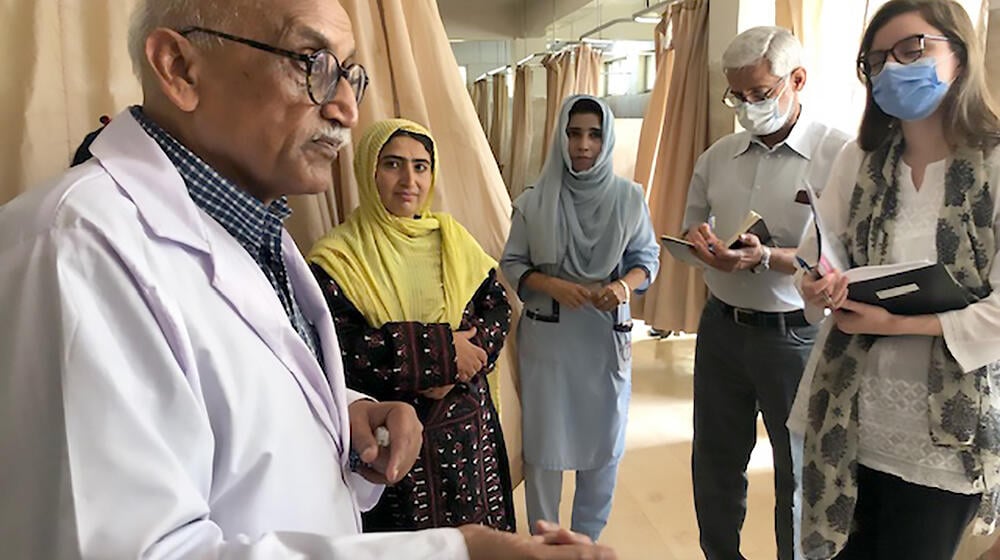Bright smiles welcome visitors and medical personnel into the fistula ward at the Koohi Goth Women’s Hospital in Karachi. Ten fistula survivors are waiting to undergo fistula repairs, and they all look hopeful.
Meanwhile, Ms. Gul Bano, 30, from Balochistan, walks around the fistula ward cheering and encouraging the women about to undergo fistula surgery.
“I am a fistula survivor myself. I had four different fistulas and had to undergo eight surgeries over two years in this same hospital. I am now fully healed,” explains Ms. Bano.
She says she and her husband, Mr. Khan, have become advocates of the campaign against fistula and go around different communities sensitising people on fistula prevention and treatment. “We also advocate against child marriages,” says Ms. Bano, who got married at the young age of 15 and fell pregnant soon after.
“My body was not ready to give birth. I was in labour for six days, and there were no health facilities close to my home. My baby died during this ordeal. It took six months for my husband to identify Koohi Goth Hospital, and I am very thankful to Dr. Shershah Syed for the cure I received,” Ms. Bano says.
Dr. Syed is one of Pakistan’s first gynaecologists to train in repairing fistula. The hospital he runs provides free fistula surgeries to women from all over Pakistan and sometimes from Afghanistan.
UNFPA Pakistan provides financial support to the hospital with funding from Global Affairs Canada (GAC) through the High Commission of Canada to Pakistan.
Seventy-four women received obstetric fistula repairs and rehabilitation support in 2021 under the project “Sihat Mand Khaandaan (SMK): Healthy Families for Pakistan through Accelerated Sexual and Reproductive Health (SRH) and Family Planning (FP) Services”. UNFPA is leading efforts under the project to ensure that national and provincial policies provide the enabling environment for inclusive, gender-sensitive family planning and sexual and reproductive health.
UNFPA has been supporting fistula repairs in hospitals and fistula camps in the country over the past years. In addition to Koohi Goth Hospital, UNFPA is finalising preparation for establishing a fistula repair centre at the Pakistan Institute of Medical Sciences (PIMS), a leading tertiary hospital in the country.
An estimated 4,000 to 5,000 women suffer from obstetric fistula every year in Pakistan. Globally, 500,000 women and girls are estimated to be living with fistula, with new cases occurring annually, according to a recent study conducted jointly by Johns Hopkins University and UNFPA on global and country fistula prevalence and incidence.
Obstetric Fistula is a devastating childbirth injury caused by prolonged, obstructed labour in the absence of timely and adequate medical care. It occurs disproportionately among impoverished, vulnerable, and marginalized girls and women as an indicator of poor quality of care. Its occurrence implies a failure of health systems to meet the needs of affected women and girls.
At the commemorative event for International Day to End Obstetric Fistula in Islamabad on 23 May 2022, UNFPA Pakistan Representative a.i. Dr. Bakhtior Kadirov said that addressing obstetric fistula requires a three-pronged approach of prevention, treatment and social reintegration, and midwives play an important role in identifying women and girls who suffer from obstetric fistula and other maternal morbidities and referring them to a hospital for assessment and further treatment and surgery.
“Overall, investment in midwives is a cost-effective and practical way for the provision of high-quality health care and services and achieving universal health coverage,” said Dr. Kadirov.
He further noted that evidence shows that when midwives are educated according to the international standards of care, including the provision of high-quality maternal health and family planning services, they can significantly contribute to averting preventable maternal deaths and disabilities.”
---Pilirani Semu-Banda


